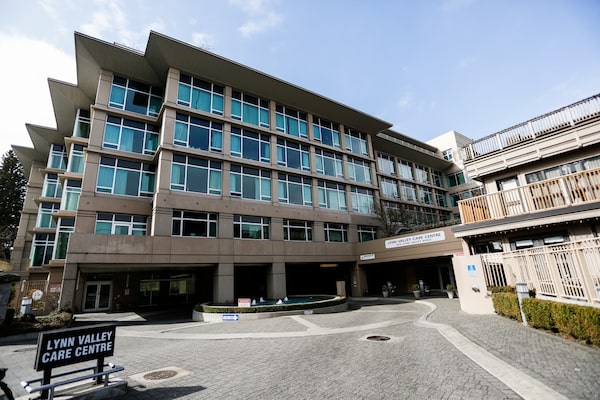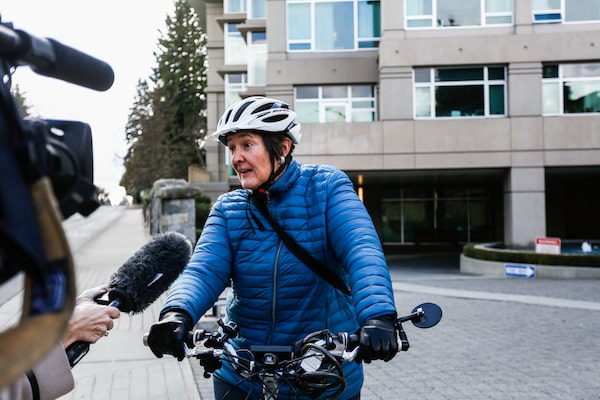
The Lynn Valley Care Centre has invoked the outbreak protocol.Jesse Winter/The Globe and Mail
On Saturday, Dr. Bonnie Henry, British Columbia’s Provincial Health Officer, convened the media to announce that there was an outbreak of coronavirus at a long-term care facility in Vancouver.
At one point in a seemingly routine press conference, she was verklempt, overcome by emotion.
Dr. Henry, a veteran of countless public-health battles, domestically and internationally, is tough as nails.
But her emotional response to news that two seniors at Lynn Valley Care Centre have been infected by coronavirus is a reminder that what we’re witnessing here is a nightmare scenario – a novel respiratory virus infiltrating a facility that is home to more than 200 seniors, many of them frail and suffering from chronic illnesses that place them at high risk.
Worse yet, one of the health-care workers at the facility is infected and may have carried the bug into the home. It’s unclear how the worker contracted COVID-19 because she has no travel history, making her Canada’s first-known case of community transmission of coronavirus.
“This is one of the scenarios that we have been, of course, most concerned about,” Dr. Henry said diplomatically.
If we want a sense of how bad this can get, and quickly, we need only cast our eyes a bit south of B.C. to the horror story unfolding at the Life Care Center in Kirkland, Wash.
The 120-bed facility in suburban Seattle has, to date, recorded 16 COVID-19 deaths. Dozens of other residents are ill in hospital.
If that was not bad enough, 70 of the 180 workers employed at the care home have shown signs of COVID-19 but have not yet been tested.
What’s unfolding in Washington state should send a shiver of dread down the spine of anyone with a loved one in care – and there are more than 350,000 people living in nursing homes, chronic care and long-term care facilities in Canada, and another 2.5 million in the U.S.
Coronavirus guide: The latest news on COVID-19 and the toll it’s taking around the world
What can I do about COVID-19? A guide for Canadians of what’s helpful, and what’s not
Everything you need to know about the coronavirus, from face masks to travel risks
Almost all of them are over the age of 70 and in this pandemic-in-all-but-name, age matters.
Among people over the age of 80 who have contracted coronavirus, the death rate is a staggering 22 per cent. In those over 70, it’s 8 per cent.
Protecting seniors, especially those in institutional care, from infection and death is an enormous challenge. So too is protecting staff, who work tirelessly and intimately with their charges.
But it has to be a priority of our response.
At the Lynn Valley Care Centre, they have invoked the outbreak protocol. That means daily monitoring of residents for symptoms, staff in protective equipment, a ban on public gatherings including communal meals, severe restrictions on visitors, and cleaning like lives depend on it (which they do).
Nursing homes and other care facilities have a fair bit of practice with these measures. A case of the flu can rip through a home in no time, leaving carnage in its wake.
What we don’t know is how much more problematic COVID-19 might be. We do know there is no vaccine (there is for the flu). Coronavirus also seems to spread more readily, especially since it lives a lot longer on surfaces than many other viruses.

Althea Gibb-Carsley speaks with reporters outside the Lynn Valley Care Centre, where her 94-year-old mother-in-law Isabelle is a resident.Jesse Winter/The Globe and Mail
But all the wonderful protocols on paper cannot mask some of the persistent challenges in care facilities, chief among them residents’ great vulnerability to infection because of their underlying health conditions, and their intense dependence on staff such as personal support workers, who can be vectors for transmission.
Complicating the response is that many workers juggle shifts between various facilities and their pay and benefits are so abysmal that they are reluctant to take time off if they are sick.
The Canadian Federation of Nurses Unions has warned that nurses (and other health workers) need much better access to protective equipment. The experience at Washington’s Life Care Center, where 40 per cent of staff ended up infected, underlines how this is essential.
The U.S. Centers for Disease Control and Prevention has recommended that everyone over the age of 60 “should stay at home as much as possible” to limit the spread of coronavirus, an eye-popping recommendation that has received very little media attention.
Let’s hope that Canadian public-health officials continue to outshine their U.S. counterparts with thoughtful, evidence-based recommendations and actions.
While we watch the situation at the Vancouver care facility with trepidation, red flags have to go up elsewhere, focusing on keeping vulnerable senior-seniors – those 75 and older – and their care providers as safe as possible, especially those in facilities that can easily become incubators for epidemics.
Editor’s note: An earlier version said 70 workers at Life Care Center had tested positive for coronavirus.
 André Picard
André Picard